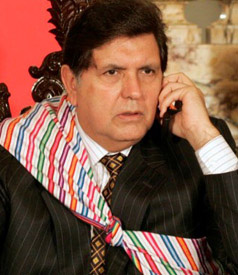
|  |  |  Editorials | Opinions | April 2009 Editorials | Opinions | April 2009  
Can Obama Clean Up in Latin America?
 Simon Tisdall - Guardian UK Simon Tisdall - Guardian UK
go to original


| | Peruvian President Alan García Pérez speaks on the phone with US President Barack Obama. (Government of Peru) |  |
Tidying up after Bush is a difficult job - and his legacy could still hinder Obama's chances at the Summit of the Americas.

Barack Obama's new broom has been working overtime since he took office, trying to tidy up George Bush's mess in the Middle East, Afghanistan and Russia. But nowhere is there more clearing up to do than in Latin America, once superciliously dubbed America's backyard. Obama's hopes of a diplomatic clean sweep at Friday's Summit of the Americas are held hostage to Bush's rubbish legacy.

Cuba provides a case in point. Obama's decision this week to ease travel and financial restrictions was hailed by western media as a dramatic turning point in bilateral relations. Latin American leaders saw it quite differently. "It's a small step in the right direction," said Celso Amorim, Brazil's foreign minister. "[But] it's important ... that the US not wait for gestures from Cuba to be able to continue." If Obama was serious about setting matters right, he should end the 47-year-old US trade embargo, he said.

Luiz Inacio Lula da Silva, Brazil's president, and other leaders are expected to push Obama to do more on Cuba when they meet in Trinidad and Tobago, the summit venue. Moves are also afoot to invite Havana to rejoin the Organisation of American States (OAS), from which it was expelled in 1962. But Cuba, which is not invited to this week's 34-country summit, has some heartfelt reservations.

In a newspaper column this week, Fidel Castro, retired from the presidency but still influential, called the OAS a "vile" institution. It was "the Ministry of Colonies of the United States" where "the trash of 60 years of betrayal of the people of Latin America" was collected. OAS officials say a decision is not expected this week.

Obama can also expect a history lesson from Hugo Chávez, Venezuela's outspoken leader, with whom US relations under Bush reached a nadir. Chávez said recently he had been considering returning Venezuela's ambassador to Washington as a goodwill gesture. But that was before Obama repeated Bush's line that Chávez was backing Colombian narco-terrorists and blocking regional progress. "He [Obama] goes and accuses me of exporting terrorism. The least I can say is that he's a poor ignoramus ... My, what ignorance! The real obstacle to development in Latin America has been the empire that you today preside over," Chávez said.

Any face-to-face encounter between Obama and Chávez will be watched closely in the US for signs of weakness or "appeasement" on the part of the White House neophyte, who has promised to engage rather than threaten America's enemies. In the region, other left-leaning governments, including Bolivia and Ecuador, may take their cue from Chávez.

Bigger economies such as Brazil, Chile and Argentina are expected to use the summit to quiz Obama on his plans to beat the global recession, which they broadly blame the US for causing. Luis Alberto Moreno, president of the Inter-American Development Bank (IDB), said 5% annual growth for the past five years had helped lift 40 million people out of poverty across Latin America. But the downturn, including reduced exports to the US, was reversing the trend. Even a 1% drop in gross domestic product would send 15 million people back into poverty, he said.

Speaking in Washington, Jeffrey Davidow, Obama's summit envoy, said the US was widely believed to have neglected its relationships in Latin America. Obama aimed to change that by listening and discussing problems on a basis of partnership. "We see this trip as part of a process of re-engaging with this hemisphere," Davidow said. Ensuring that "the poorest of the poor, the voiceless, should not pay a disproportionate amount of the cost of the [economic] crisis" was a key aim. Obama would also discuss energy, climate change and security issues.

That last topic will lead the agenda when Obama stops off in Mexico City on Thursday on his way to the summit. The president recently pledged more money and resources to combat cross-border drug-trafficking and related violence that killed 6,300 people in Mexico last year. He is also under pressure to curb the flow of US-made guns and deal more fairly with 12 million illegal immigrants in the US, mostly from Mexico and Central America.

Mexico's leaders, like those elsewhere in the region, have heard Washington promises to do better many times before. Now they are looking for concrete actions leading from the summit. "What matters is the day after," said the IDB's Moreno. "If the US is saying that they're willing to listen and learn ... you have to walk the walk." |

 |
|  |



